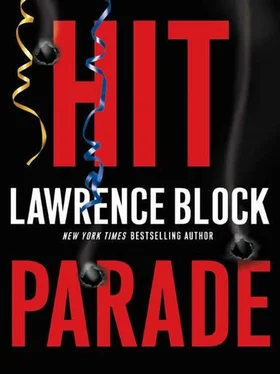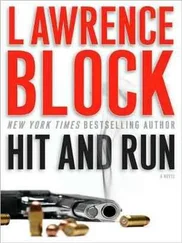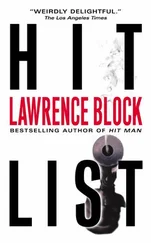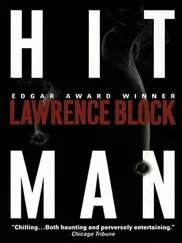But a moment’s observation clarified the situation. The man in the porkpie hat-who had, Keller noted, a face straight out of an OTB parlor, a woulda-coulda-shoulda gambler’s face-was doing a little business, buying tickets from people who had too many, selling them to people who had too few. So he wouldn’t be sitting next to Keller. Someone else would, but it would be someone he hadn’t met, so it would be easy to keep an intimacy barrier in place.
Keller went up to the man in the hat, showed him one of the tickets. The man said “Fifty bucks,” and Keller pointed out that it was a $96 ticket. The man gave him a look, and Keller took the ticket back.
“Jesus,” the man said. “What do you want for it, anyway?”
“Eighty-five,” Keller said, picking the number out of the air.
“That’s crazy.”
“The Pacers and the Knicks? Section two-fourteen? I bet I can find somebody who wants it eighty-five dollars’ worth.”
They settled on $75, and Keller pocketed the money and used his other ticket to enter the arena. Then it struck him that he could have unloaded both tickets and had $150 to show for it, and gone straight home, spared the ordeal of a basketball game. But he was already through the turnstile when the thought came to him, and by that point he no longer had a ticket to sell.
He found his seat and sat down to watch the game.
Keller, an only child,was raised by his mother, whom he had come to realize in later years was probably mentally ill. He never suspected this at the time, although he was aware that she was different from other people.
She kept a picture of Keller’s father in a frame in the living room. The photograph showed a young man in a military uniform, and Keller grew up knowing his father had been a soldier, a casualty of the war. As a teenager, he’d been employed cleaning out a stockroom, and one of the boxes of obsolete merchandise he’d hauled out had contained picture frames, half of them containing the familiar photograph of his putative father.
It occurred to him that he ought to mention this to his mother. On further thought, he decided not to say anything. He went home and looked at the photo and wondered who his father was. A soldier, he decided, though not this one. Someone passing through, who’d fathered a son and never knew it.
And died in battle? Well, a lot of soldiers did. His father might very well have been one of them.
Growing up, in a fatherless home with a mother who didn’t seem to have any friends or acquaintances, was something Keller had been on the point of addressing in therapy, until a problem with his therapist put an end to that experiment. He’d had trouble deciding just how he felt about his mother but had ultimately come to the conclusion that she was a good woman who’d done a good job of raising him, given her limitations. She was a serviceable cook if not an imaginative one, and he had a hot breakfast every morning and a hot dinner every night. She kept their house clean and taught Keller to be clean about his person. She was detached, and talked more to herself than to him-and, in the afternoons, talked to the characters in her TV soap operas.
She bought him presents at Christmas and on his birthday, usually clothing to replace garments he’d outgrown, but occasionally something more interesting. One year she bought him an Erector set, and he’d proved quite hopeless at following the diagrams in an effort to produce a flatbed railcar, or, indeed, anything else. Another year’s present was a beginner’s stamp collecting kit-a stamp album, a packet of stamps, a pair of tongs to pick them up with, and a supply of hinges for mounting them in the album. The Erector set wound up in the closet, gathering dust, but the stamp album turned out to be the foundation of a lifelong hobby. He’d abandoned it after high school, of course, and the original album was long gone, but Keller had taken up the hobby again as an adult and cheerfully poured much of his spare time and extra cash into it.
Would he have become a stamp collector if not for his mother’s gift? Possibly, he thought, but probably not. It was one more reason to thank her.
The Erector set was a good thought that failed, the stamp album an inspiration. The biggest surprise, though, of all the gifts she gave him, was neither of these.
That would have to be the basketball backboard.
Keller hadn’t botheredto note the seat number of the ticket he sold to the man in the porkpie hat. His own seat was number 117, situated unsurprisingly enough between seats 116 and 118, both of them unoccupied when he sat down between them. Then two men came along and sat down in 115 and 116. One was substantially older than the other, and Keller found himself wondering if they were father and son, boss and employee, uncle and nephew, or gay lovers. He didn’t really care, but he couldn’t keep from wondering, and he kept changing his mind.
The game had already started by the time a man turned up and sat down in 118. He was wearing a dark suit with a subtle pinstripe and looked as though he’d come straight from the office, an office where he spent his days doing something no one, least of all the man himself, would describe as interesting.
The man in the porkpie hat had paid Keller $75 for that seat, which suggested that the man in the suit must have paid at least $100 for it, and perhaps as much as $125. But of course the fellow had no idea that Keller was the source of his ticket, and in fact paid no attention to Keller, devoting the full measure of his attention to the action on the court, where the Pacers had jumped off to an early lead.
Keller, with some reluctance, turned his attention to the game.
Across the streetand two doors up from Keller’s house, a family named Breitbart filled a large frame house to overflowing. Mr. Breitbart owned and ran a furniture store on Euclid Avenue, and Mrs. Breitbart stayed home and, for a while at least, had a baby every year. The year Keller was born she had two-twin sons, Andrew and Randall, the names no doubt selected so that their nicknames could rhyme. The twins were the family’s only boys; the other five little Breitbarts, some older than the twins, the rest younger, were all girls.
Every afternoon, weather permitting, boys gathered in the Breitbart backyard to play basketball. Sometimes they divided into teams, and one side took off their shirts, and they played the sort of half-court game you could play with a single garage-mounted backboard. Other times, when fewer boys showed up or for some other reason, they found other ways to compete-playing Horse, say, where each player had to duplicate the particular shot of the first player. There were other games as well, but Keller, watching idly from across the street, was less clear on their rules and objectives.
One night at dinner, Keller’s mother told him he should go across the street and join the game. “You watch all the time,” she said-inaccurately, as he only occasionally let himself loll on the sidewalk watching the action in the Breitbart yard. “I bet they’d love it if you joined in. I bet you’d be good at it.”
As it turned out, she lost both bets.
Keller, a quiet boy, always felt more at ease with grown-ups than with his contemporaries. On his own, he moved with an easy grace; in group sports, self-consciousness turned him awkward and made him ill at ease. Nonetheless, later that week he crossed the street and presented himself in the Breitbart backyard. “It’s Keller,” Andy or Randy said. “From across the street.” Someone tossed him the ball, and he bounced it twice and tossed it unsuccessfully at the basket.
They chose up sides, and he, the unknown quantity, was picked last, which struck him as reasonable enough. He was on the Skins team, and shucked his shirt, which made him feel a little self-conscious, but that was nothing compared to the self-consciousness that ensued when the game began.
Читать дальше












